HVAC Companies Brewood
Top HVAC Contractor in Brewood
Receive up to 3 HVAC Companies quotes for your project today! Compare profiles, reviews, accreditations, portfolio, etc... and choose the best offer.
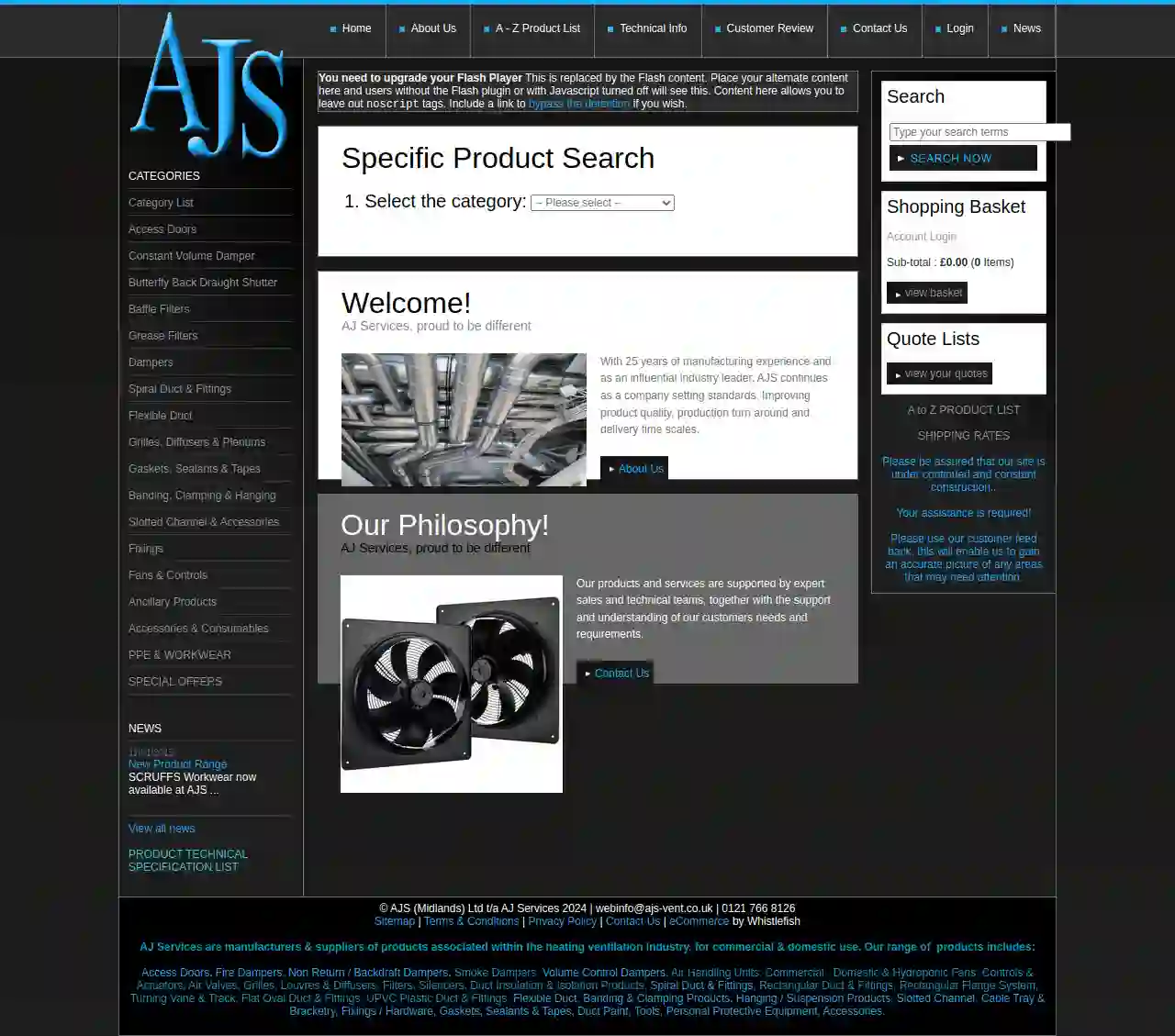
A J Services
Units 2 & 3 Viking Park Viking Tame Valley Trading Estate Wilnecote Tamworth Staffs, Tamworth, B77 5DU, GBAJ Services, proud to be different, is a company with 25 years of manufacturing experience and a leader in the industry. With a focus on improving product quality, production turnaround, and delivery timescales, AJS continues to set standards. The company's products and services are supported by expert sales and technical teams, as well as a deep understanding of customers' needs and requirements. AJ Services is a manufacturer and supplier of products associated with the heating ventilation industry, including Access Doors, Fire Dampers, Non-Return/Backdraft Dampers, Smoke Dampers, Volume Control Dampers, Air Handling Units, Commercial, Domestic, and Hydroponic Fans, Controls & Actuators, Air Valves, Grilles, Louvres & Diffusers, Filters, Silencers, Duct Insulation & Isolation Products, Spiral Duct & Fittings, Rectangular Duct & Fittings, Rectangular Flange System, Turning Vane & Track, Flat Oval Duct & Fittings, UPVC Plastic Duct & Fittings, Flexible Duct, Banding & Clamping Products, Hanging/Suspension Products, Slotted Channel, Cable Tray & Bracketry, Fixings/Hardware, Gaskets, Sealants & Tapes, Duct Paint, Tools, Personal Protective Equipment, and Accessories.
- Services
- Why Us?
- Gallery
Get Quote
Stuart Brown Plumbing and Heating Ltd
4.645 reviews66 Lyon Drive, Tamworth, B77 2TJ, GBStuart Brown Plumbing & Heating is a provider of excellent domestic Plumbing & Heating Services for over 25 years carried out by a qualified professional, recommended by Age Concern, Trading Standards and a registered installer for Veissmann boilers. We cover the following areas: Tamworth, Lichfield, Sutton Coldfield, Atherstone, Nuneaton, Coleshill, Measham, Swadlincote, Ashby de la Zouch. Save Energy ....... Upgrade your boiler and save £££'s on your fuel bills! Company No: 4501321 registered in England and Wales VAT Registered No: 799530081
- Services
- Why Us?
- Accreditations
- Our Team
- Testimonials
- Gallery
Get Quote
Friary Heating
543 reviews7 Irving Close, Lichfield, WS13 7EN, GBWelcome to Friary Heating. We are a trusted local company offering expertise and excellence for all your heating needs. With 15 years of experience designing, installing, maintaining and repairing heating systems from a wide range of manufacturers, we are here to help you with all your boiler and heating requirements. Whether you're looking to discuss a new boiler with a heating expert or are in need of boiler service or repair, get in touch! For a free, no obligation quote or to discuss your job: Send Us a Message Or Call Adam on 07920 388 224
- Services
- Why Us?
- Our Team
- Gallery
Get Quote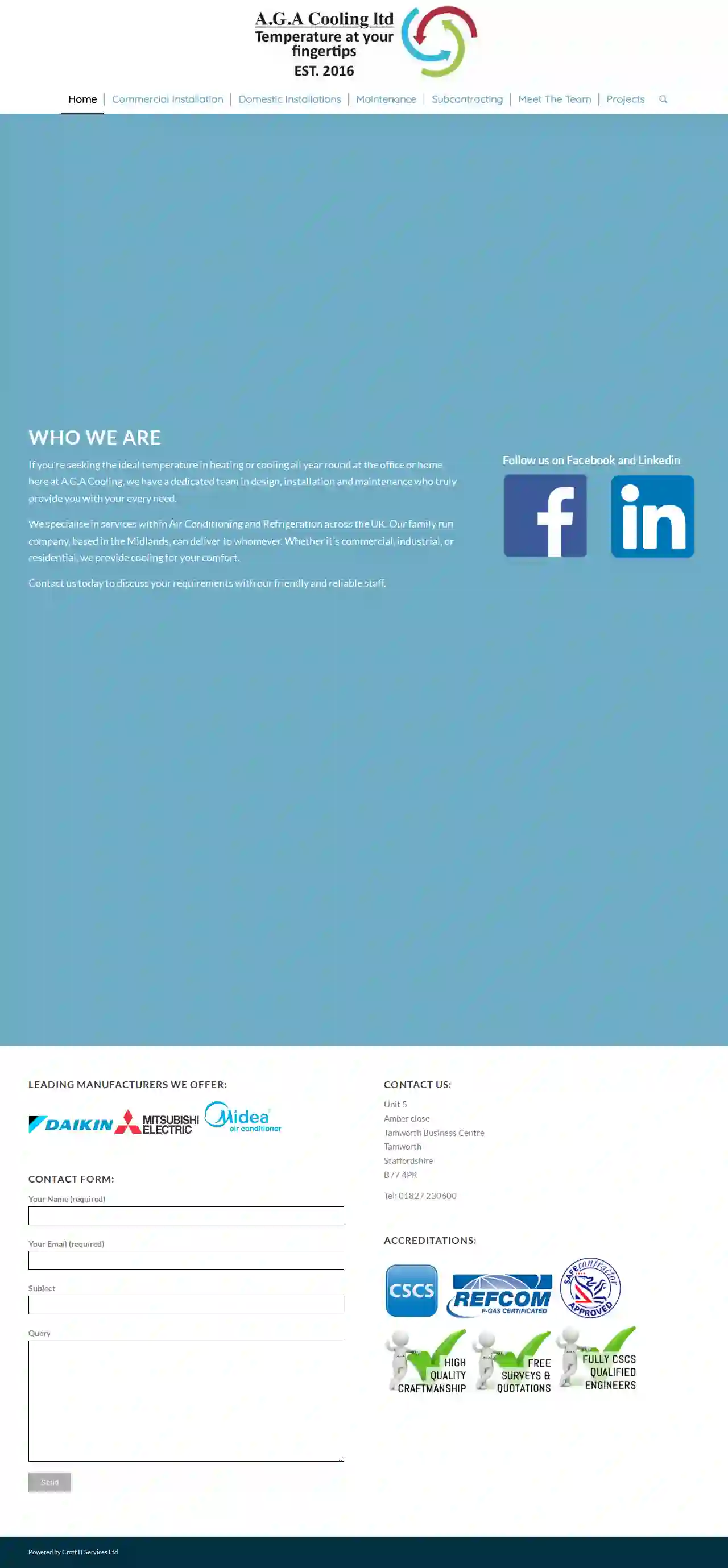
A.G.A Cooling ltd
519 reviewsAmber close, Tamworth Business Centre, Unit 5, Tamworth, B77 4PR, GBIf you’re seeking the ideal temperature in heating or cooling all year round at the office or home here at A.G.A Cooling, we have a dedicated team in design, installation and maintenance who truly provide you with your every need. We specialise in services within Air Conditioning and Refrigeration across the UK. Our family run company, based in the Midlands, can deliver to whomever. Whether it’s commercial, industrial, or residential, we provide cooling for your comfort.
- Services
- Why Us?
- Gallery
Get Quote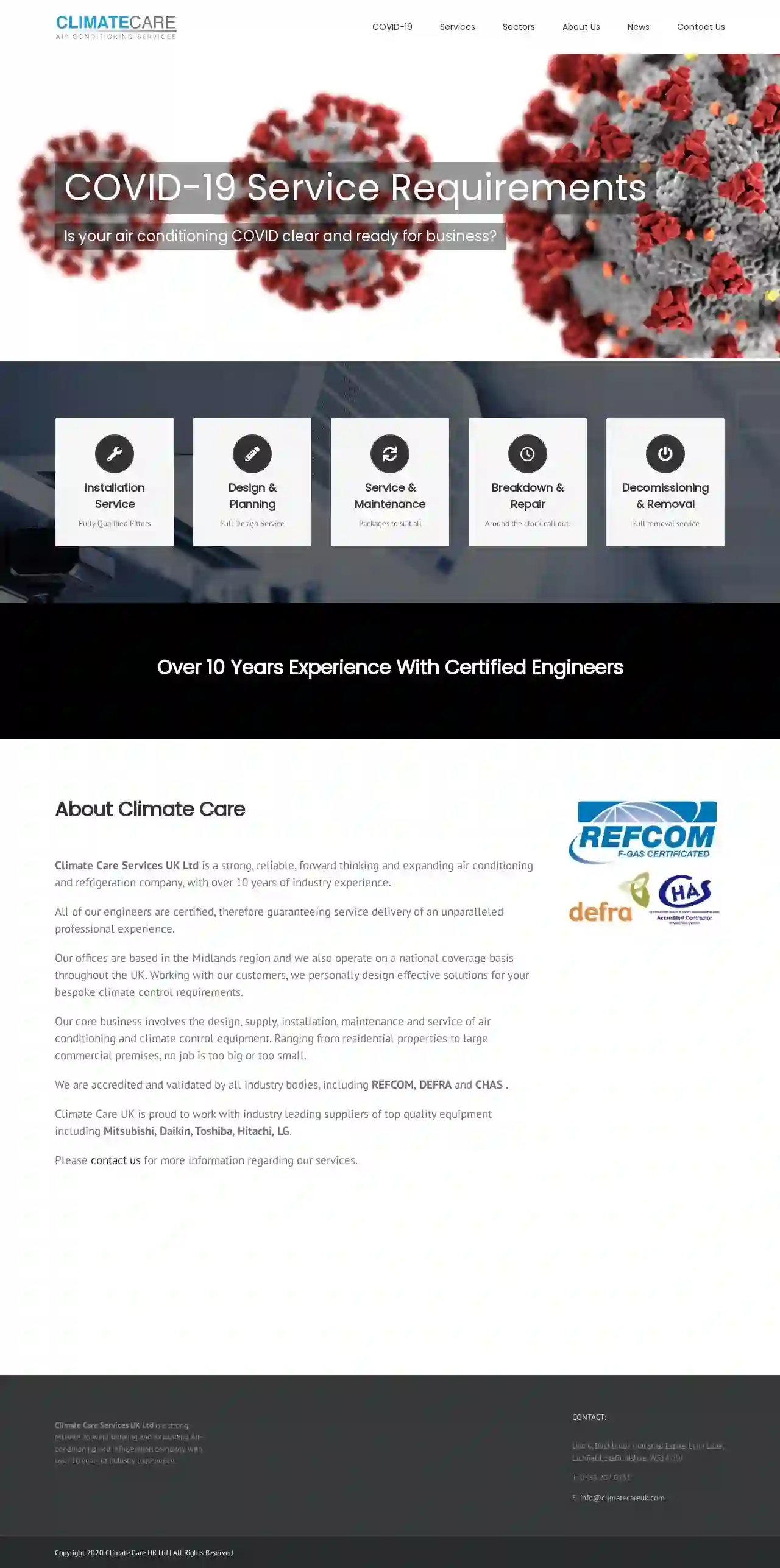
Climate Care Services UK Ltd
56 reviewsUnit 6, Birchbrook Industrial Estate, Lynn Lane, Lichfield, WS14 0DJ, GBClimate Care UK is a strong, reliable, forward-thinking and expanding air conditioning and refrigeration company, with over 10 years of industry experience. All of our engineers are certified, therefore guaranteeing service delivery of an unparalleled professional experience. Our offices are based in the Midlands region and we also operate on a national coverage basis throughout the UK. Working with our customers, we personally design effective solutions for your bespoke climate control requirements. Our core business involves the design, supply, installation, maintenance and service of air conditioning and climate control equipment. Ranging from residential properties to large commercial premises, no job is too big or too small. We are accredited and validated by all industry bodies, including REFCOM, DEFRA and CHAS. Climate Care UK is proud to work with industry leading suppliers of top quality equipment including Mitsubishi, Daikin, Toshiba, Hitachi, LG. Please contact us for more information regarding our services.
- Services
- Why Us?
- Accreditations
- Gallery
Get Quote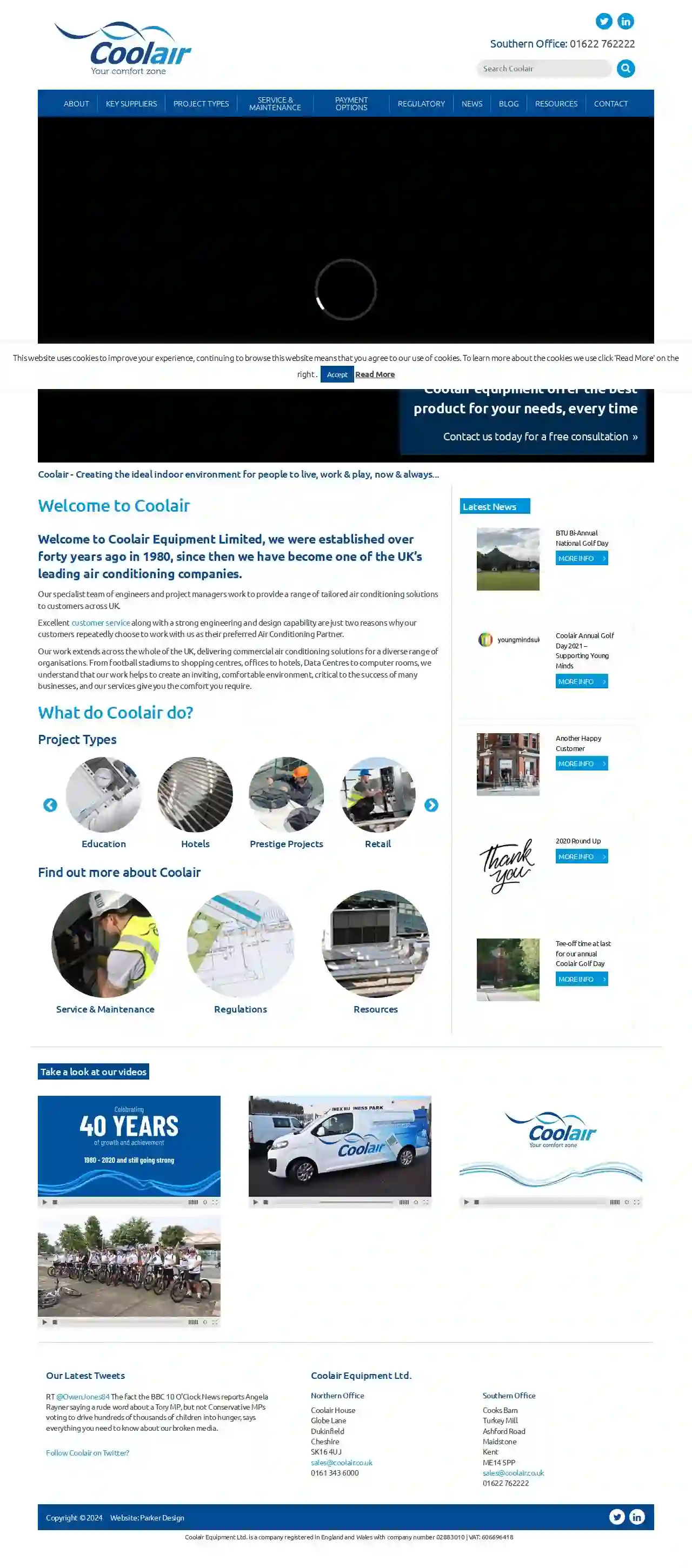
Coolair Equipment Limited
Globe Lane, Coolair House, Dukinfield, SK16 4UJ, GBWelcome to Coolair Equipment Limited, we were established over forty years ago in 1980, since then we have become one of the UK’s leading air conditioning companies. Our specialist team of engineers and project managers work to provide a range of tailored air conditioning solutions to customers across UK. Excellent customer service along with a strong engineering and design capability are just two reasons why our customers repeatedly choose to work with us as their preferred Air Conditioning Partner. Our work extends across the whole of the UK, delivering commercial air conditioning solutions for a diverse range of organisations. From football stadiums to shopping centres, offices to hotels, Data Centres to computer rooms, we understand that our work helps to create an inviting, comfortable environment, critical to the success of many businesses, and our services give you the comfort you require.
- Services
- Why Us?
- Gallery
Get Quote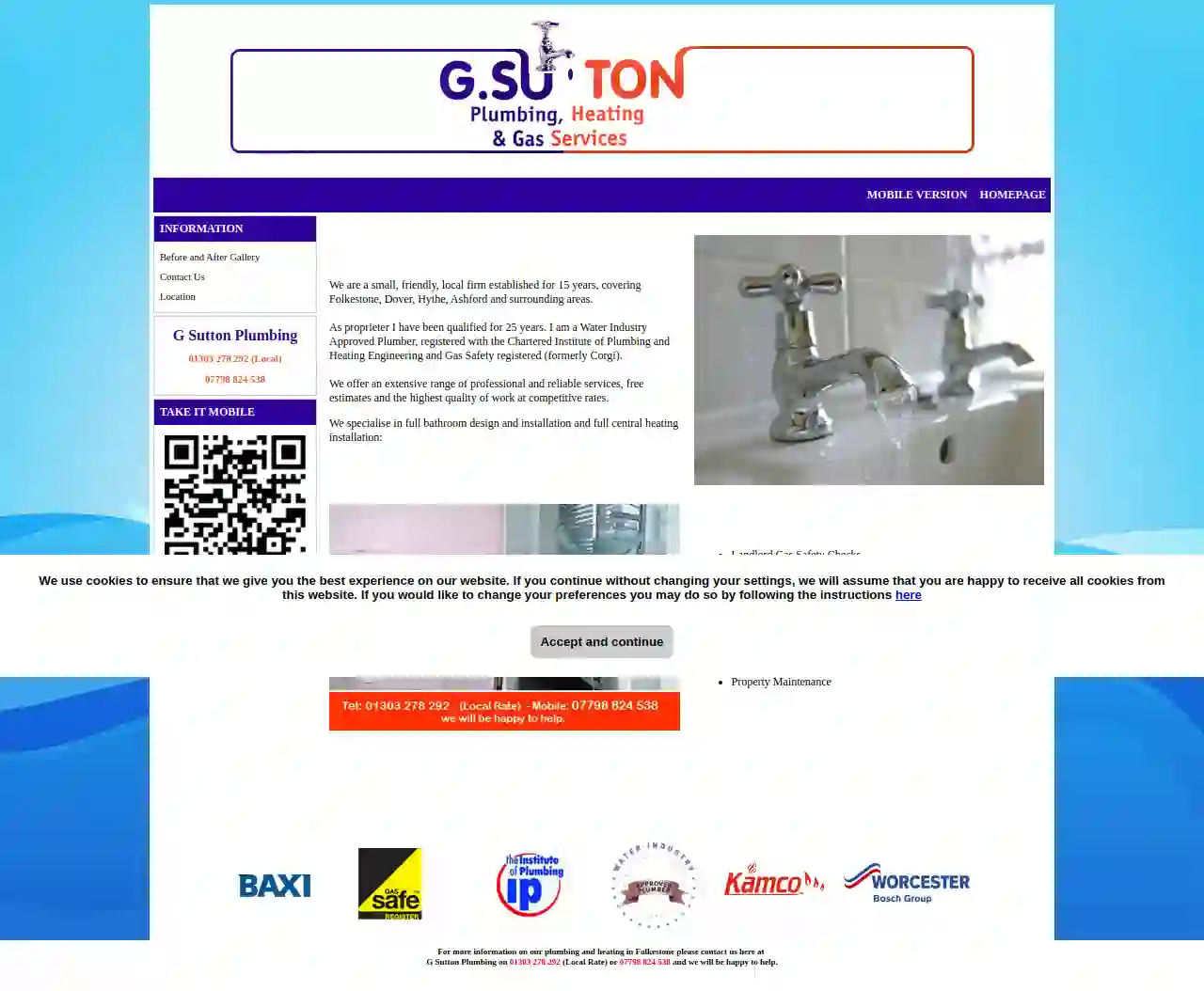
G Sutton Plumbing Heating & Gas Services
51 reviewsStone, GBWe are a small, friendly, local firm established for 15 years, covering Folkestone, Dover, Hythe, Ashford and surrounding areas. As proprieter I have been qualified for 25 years. I am a Water Industry Approved Plumber, registered with the Chartered Institute of Plumbing and Heating Engineering and Gas Safety registered (formerly Corgi). We offer an extensive range of professional and reliable services, free estimates and the highest quality of work at competitive rates. We specialise in full bathroom design and installation and full central heating installation: Landlord Gas Safety Checks, Cylinder Replacements, Boilers, New Heating Installations and Repairs, Showers, Bathrooms - Complete Bathroom Alterations and Renovations, Kitchens Floor and Wall Tiles, Power Flushing, Underfloor Heating, Property Maintenance. For more information on our plumbing and heating in Folkestone please contact us here at G Sutton Plumbing on 01303 278 292 (Local Rate) or 07798 824 538 and we will be happy to help.
- Services
- Why Us?
- Our Team
- Gallery
Get Quote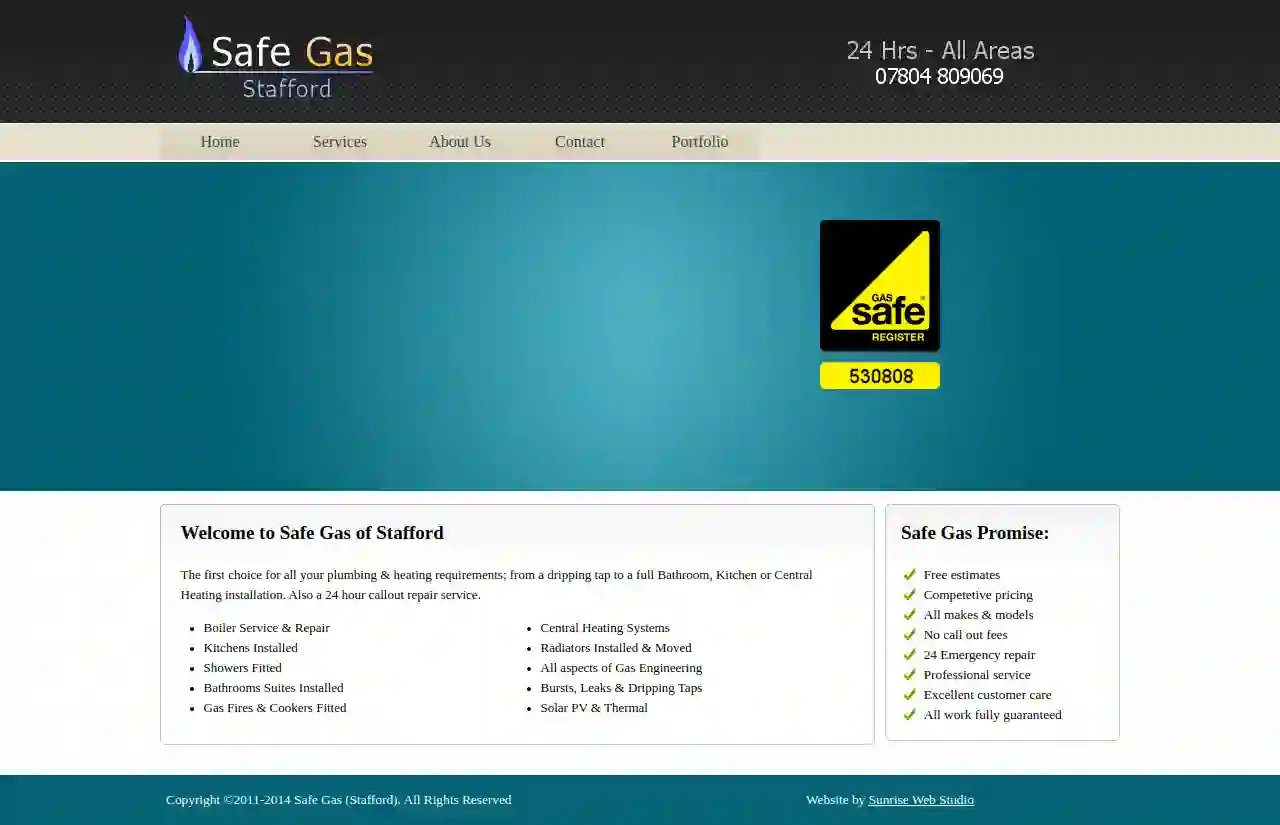
Safe Gas ( Stafford )
10, Copper Glade, Stafford, ST16 3RJ, GBSafe Gas of Stafford is a Gas Safe registered business with experience in all aspects of gas, domestic central heating, and plumbing. In addition to plumbing services, they also offer building services such as extensions, new builds, alterations, renovations, and plastering. Safe Gas serves Stafford, Cannock, Penkridge, Stoke, Telford, Wolverhampton, Birmingham, and the wider Midlands. They pride themselves on providing high-quality work, from simple repairs to full installations, and offer a 24-hour callout repair service.
- Services
- Why Us?
- Accreditations
- Testimonials
- Gallery
Get Quote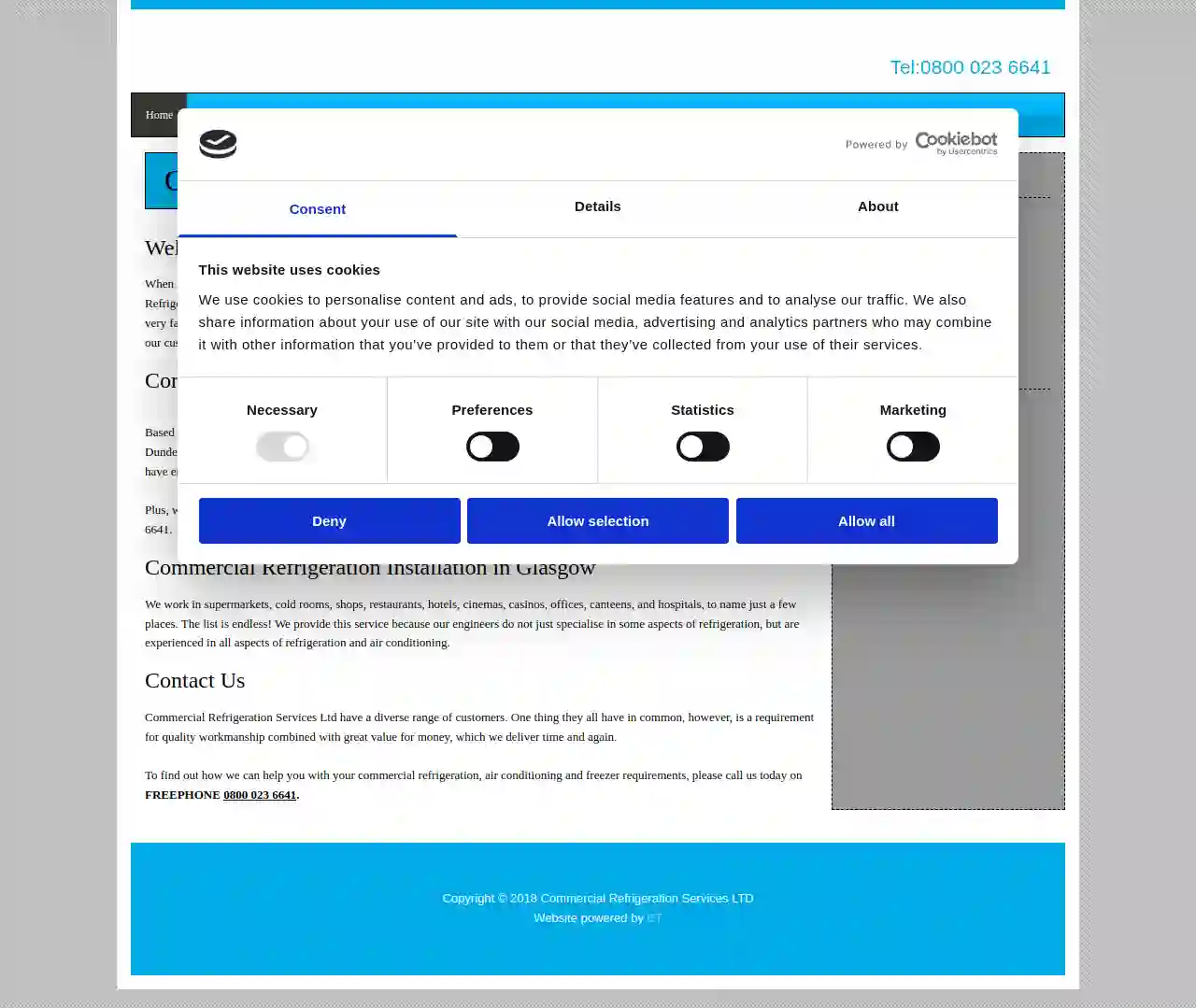
Commercial Refrigeration Services
3.73 reviewsTownhill, Dunfermline, 25 Green Street, KY12 0HE, GBCommercial Refrigeration Services Ltd is a company based in Fife, Scotland, that has been providing refrigeration and air conditioning services since 2009. They specialize in servicing, maintaining, and installing a wide range of refrigeration units, including cabinets, air conditioning units, and freezers. The company covers Central Scotland, including Edinburgh and the Lothians, Glasgow and the Strathclyde areas, Stirling, Falkirk, Dundee, and Perth. They pride themselves on providing a first-rate service to all their customers and offer complete service packages, maintenance contracts, and a 24-hour emergency call-out service. Their engineers are experienced, FGAS registered, and some are also Care Gas certified, allowing them to work on R290 refrigerant cabinets.
- Services
- Why Us?
- Accreditations
- Gallery
Get Quote
Air-Row Heating and Air Conditioning
4.935 reviews120 Wintergreen Ln, Stafford, 22554, GBAir-Row Heating & Air Conditioning is a family-owned and operated HVAC company serving Stafford, VA and the surrounding counties, including Fredericksburg, Woodbridge, and Spotsylvania. For over 20 years, we've been dedicated to providing our customers with the highest quality products and services at competitive prices. We pride ourselves on building strong relationships with our customers based on trust, transparency, and exceptional service. Our team of experienced technicians is fully licensed and insured, ensuring you receive reliable and professional service for all your heating and cooling needs. Whether you need a new system installation, routine maintenance, or emergency repairs, Air-Row is here to keep you comfortable year-round. We're committed to exceeding your expectations and providing a seamless experience from start to finish.
- Services
- Why Us?
- Our Team
- Testimonials
- Gallery
Get Quote
Over 12,692+ HVAC Companies onboarded
Our HVAC pros operate in Brewood & surrounding areas!
HVACCompaniesHub has curated and vetted Top HVAC Businesses in Brewood. Find a reliable contractor today.
Frequently Asked Questions About HVAC Companies
- Regular Air Filter Replacement: Change or clean your HVAC system’s air filters regularly (every 1-3 months).
- Professional Air Duct Cleaning: Have your air ducts cleaned by professionals every few years to eliminate dust, mold, and other contaminants.
- Improve Ventilation: Ensure adequate ventilation in your home to bring in fresh air and exhaust stale air. Use exhaust fans in kitchens and bathrooms.
- Control Humidity Levels: Use a humidifier or dehumidifier to maintain optimal humidity levels and prevent mold growth.
- Clean Regularly: Dust and vacuum frequently to minimize airborne particles.
- Avoid Smoking Indoors: Smoking indoors significantly reduces IAQ.
- Use Natural Cleaning Products: Opt for natural cleaning products that don’t release harmful VOCs (volatile organic compounds).
- Monitor Indoor Air Quality: Consider using an indoor air quality monitor to track pollutant levels.
- Experience: Choose a contractor with extensive experience in the HVAC industry, especially in the type of service you need.
- Licensing and Insurance: Verify that the contractor is properly licensed and insured.
- Certifications: Look for NATE (North American Technician Excellence) certification, which indicates a high level of technical competency.
- Reputation: Check online reviews and ratings to assess the contractor's reputation and customer satisfaction levels.
- References: Ask for references from past customers and contact them to inquire about their experience.
- Estimates and Quotes: Get written estimates or quotes from multiple contractors to compare pricing and services.
- Warranty Information: Ask about warranties on equipment and labor.
- Communication: Effective communication is key. Choose a contractor who responds promptly and clearly answers your questions.
What is a SEER rating, and why is it important?
What is an AFUE rating, and why is it important?
How can I improve my home's indoor air quality?
How do I choose the right HVAC contractor?
What is a SEER rating, and why is it important?
What is an AFUE rating, and why is it important?
How can I improve my home's indoor air quality?
- Regular Air Filter Replacement: Change or clean your HVAC system’s air filters regularly (every 1-3 months).
- Professional Air Duct Cleaning: Have your air ducts cleaned by professionals every few years to eliminate dust, mold, and other contaminants.
- Improve Ventilation: Ensure adequate ventilation in your home to bring in fresh air and exhaust stale air. Use exhaust fans in kitchens and bathrooms.
- Control Humidity Levels: Use a humidifier or dehumidifier to maintain optimal humidity levels and prevent mold growth.
- Clean Regularly: Dust and vacuum frequently to minimize airborne particles.
- Avoid Smoking Indoors: Smoking indoors significantly reduces IAQ.
- Use Natural Cleaning Products: Opt for natural cleaning products that don’t release harmful VOCs (volatile organic compounds).
- Monitor Indoor Air Quality: Consider using an indoor air quality monitor to track pollutant levels.
How do I choose the right HVAC contractor?
- Experience: Choose a contractor with extensive experience in the HVAC industry, especially in the type of service you need.
- Licensing and Insurance: Verify that the contractor is properly licensed and insured.
- Certifications: Look for NATE (North American Technician Excellence) certification, which indicates a high level of technical competency.
- Reputation: Check online reviews and ratings to assess the contractor's reputation and customer satisfaction levels.
- References: Ask for references from past customers and contact them to inquire about their experience.
- Estimates and Quotes: Get written estimates or quotes from multiple contractors to compare pricing and services.
- Warranty Information: Ask about warranties on equipment and labor.
- Communication: Effective communication is key. Choose a contractor who responds promptly and clearly answers your questions.